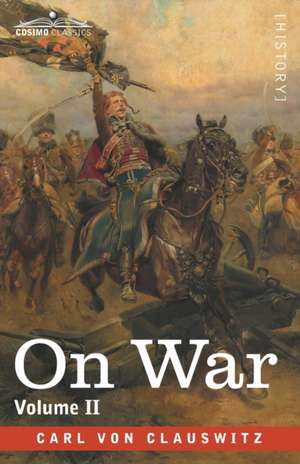On War Volume II
Autor Carl Von Clausewitzen Limba Engleză Paperback – 17 noi 2020
On War is Carl von Clausewitz' masterpiece on war and military strategy, which was written between 1816 and 1830 and was published posthumously by his wife Marie von Clausewitz (n e von Br hl) in 1832.
Three main concepts of war stand out: war should be seen as an instrument of politics; the military objectives in war that support one's political objectives fall into two types: "war to achieve limited aims" and war to "disarm" the enemy; and the course of war will tend to favor the party with the stronger emotional and political motivations, but especially the defender.
This edition is the classical translation of On War (1873) by Col. J.J. Graham, with an introduction and notes by Colonel F.N. Maude, published in three volumes. A must-read for military historians and theorists, policy makers, and anyone interested in understanding the philosophy and concepts of war.
| Toate formatele și edițiile | Preț | Express |
|---|---|---|
| Paperback (1) | 146.60 lei 6-8 săpt. | |
| COSIMO CLASSICS – 17 noi 2020 | 146.60 lei 6-8 săpt. | |
| Hardback (1) | 178.31 lei 6-8 săpt. | |
| COSIMO CLASSICS – 18 noi 2020 | 178.31 lei 6-8 săpt. |
Preț: 146.60 lei
Nou
Puncte Express: 220
Preț estimativ în valută:
28.06€ • 30.49$ • 23.59£
28.06€ • 30.49$ • 23.59£
Carte tipărită la comandă
Livrare economică 21 aprilie-05 mai
Preluare comenzi: 021 569.72.76
Specificații
ISBN-13: 9781646792887
ISBN-10: 1646792882
Pagini: 424
Dimensiuni: 140 x 216 x 25 mm
Greutate: 0.54 kg
Editura: COSIMO CLASSICS
ISBN-10: 1646792882
Pagini: 424
Dimensiuni: 140 x 216 x 25 mm
Greutate: 0.54 kg
Editura: COSIMO CLASSICS
Notă biografică
Carl von Clausewitz (1780 - 1831) was a Prussian general and military theorist who stressed the "moral" (in modern terms, psychological) and political aspects of war. His most notable work, Vom Kriege (On War), was unfinished at his death. Clausewitz was a realist and, while in some respects a romantic, also drew heavily on the rationalist ideas of the European Enlightenment. He stressed the dialectical interaction of diverse factors, noting how unexpected developments unfolding under the "fog of war" (i.e., in the face of incomplete, dubious, and often completely erroneous information and high levels of fear, doubt, and excitement) call for rapid decisions by alert commanders. He saw history as a vital check on erudite abstractions that did not accord with experience. He argued that war could not be quantified or reduced to map-work, geometry, and graphs. Clausewitz had many aphorisms, of which the most famous is "War is the continuation of politics by other means."
